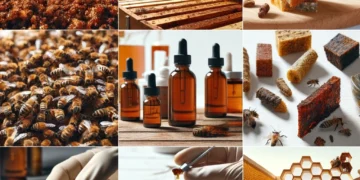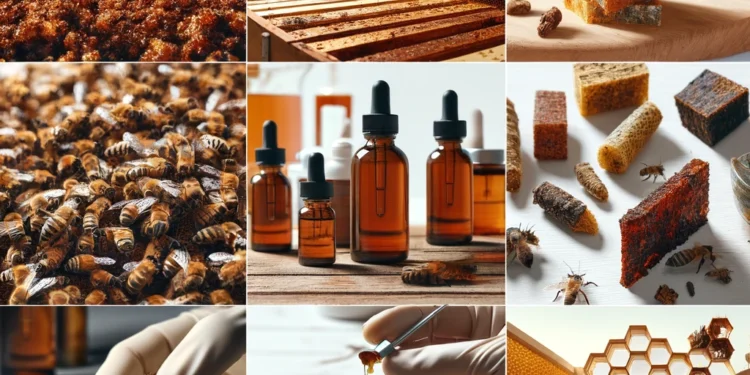What is Propolis? The Natural Resin with Powerful Health Benefits
Propolis is a resinous material collected by honeybees from tree buds and sap flows. Bees use it to seal cracks in their hive and protect against intruders. This strange, sticky substance has been used in traditional medicine for centuries and contains over 300 natural compounds with antioxidant, antibacterial, anti-fungal, and anti-inflammatory properties.
Chemical Structure and Properties
The chemical composition of Propolis depends on the tree species bees collect it from. But some common components 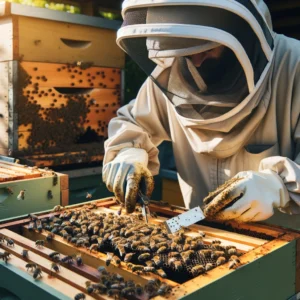 include flavonoids, phenolic acids, and terpenes. The main bioactive compounds found in Propolis are pinocembrin, pinobanksin, caffeic acid phenethyl ester, and quercetin. These plant-derived compounds are responsible for many of Prolipos’ medicinal effects.
include flavonoids, phenolic acids, and terpenes. The main bioactive compounds found in Propolis are pinocembrin, pinobanksin, caffeic acid phenethyl ester, and quercetin. These plant-derived compounds are responsible for many of Prolipos’ medicinal effects.
Propolis is a complex mixture that is one-half resin, one-third wax, 10% essential oils, 5% pollen, and 5% various organic compounds. The wax and resin provide a sticky, malleable texture, while the volatile oils and flavonoids contribute antioxidant and antimicrobial effects.
Role as a “Bee Glue”
The name Propolis comes from Greek and means “defense of the city.” Bees use it to seal unwanted open spaces in the hive. By filling cracks and gaps with it, bees can protect against drafts and the entry of pests like mice, lizards, and snakes. The antimicrobial properties of Propolis also stop bacterial and fungal infections from spreading through the hive.
Propolis has the scientific name of Balsamum and Mellissophyllum. It’s sometimes referred to as “bee glue” thanks to its sticky, adhesive texture.
History and Origins
Propolis was first isolated in 1910 by a French pharmacist named Joseph Charles Emile Clauser. Ancient civilizations like the Egyptians, Romans, and Greeks were aware of Propolis and used it for its medicinal properties. Hippocrates promoted the use of it for healing sores and ulcers.
The first records of humans intentionally collecting Propolis date back to the Ancient Egyptians, who valued it for embalming mummies. Propolis was also popular in Ancient Greece and Rome for healing wounds. Roman soldiers reportedly carried propolis-coated bandages to treat injuries on the battlefield.
Propolis in Traditional Medicine
Propolis has a long history of medicinal use in folk medicine. Many cultures applied it topically to help heal wounds, burns, and sores thanks to its antimicrobial and anti-inflammatory effects. It was also used to treat gastrointestinal issues like ulcers.
Research has validated many of Propolis‘ traditional uses. Studies show that it accelerates wound healing, soothes sore throats, and reduces inflammation in the gastrointestinal tract. Propolis also appears to have antioxidant, anticancer, antidiabetic, and neuroprotective properties.
Health Benefits Discovered in Recent Decades
While Propolis has been used medicinally for millennia, scientists are still uncovering new health benefits:
Immune Support
– Propolis boosts immune
 cell activity and contains antibacterial, antiviral, and antifungal compounds. Studies show propolis may help fight colds, flu, and upper respiratory infections.
cell activity and contains antibacterial, antiviral, and antifungal compounds. Studies show propolis may help fight colds, flu, and upper respiratory infections.Anti-Inflammatory
– The natural compounds in Propolis reduce inflammatory cytokines, prostaglandins, and enzymes like COX-2. This anti-inflammatory action may relieve joint pain, eczema, and inflammatory bowel disease.
Antioxidant
– Propolis contains high levels of polyphenols that neutralize free radicals and prevent oxidative damage to cells. Oxidative stress contributes to aging and chronic diseases.
Antimicrobial
– Propolis inhibits the growth of bacteria, fungi, protozoa, and viruses. Lab studies find Propolis is effective against staph, strep, salmonella, E. coli, and even drug-resistant bacteria.
Wound Healing
– Applying Propolis to
 wounds may speed up the healing process by stimulating collagen production and reducing inflammation.
wounds may speed up the healing process by stimulating collagen production and reducing inflammation.Dental Health
– Components in Propolis fight bacteria involved in cavities and gum disease. It may be useful for preventing and treating oral infections.
Cancer Prevention
– Early cell studies indicate that Propolis may slow the growth of certain cancer cells. More research is needed, but it shows promise for suppressing tumor growth.
Natural Sources of Propolis
Honeybees make Propolis from resinous saps and gums gathered from trees and shrubs. Different Propolis sources produce Propolis with varying chemical compositions:
- Poplar Trees – Bees commonly collect Propolis from poplar buds in Europe and North America. Poplar Propolis contains high levels of flavonoids.
- Conifers – Propolis from
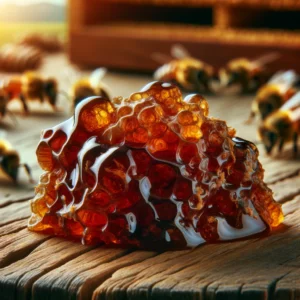 conifer trees like pine and fir is a major source in Russia. Conifer Propolis is rich in polyphenols called lignans.
conifer trees like pine and fir is a major source in Russia. Conifer Propolis is rich in polyphenols called lignans. - Clusia – Bees in tropical regions gather Propolis from Clusia flowers, known for their antioxidant and antimicrobial effects. Clusia Propolis contains high levels of polyprenylated benzophenones.
- Baccharis – Propolis from the Baccharis genus dominates in Brazil. Baccharis Propolis has anti-inflammatory and wound healing properties.
What Foods Contain Propolis?
Since foraging bees produce Propolis, it’s not found naturally in foods. But it is sometimes used as an ingredient in:
- Honey – Some types of honey, especially Brazilian green Propolis honey, have it added to them. This enhances the honey with antioxidant and antibacterial effects.
- Chewing Gum – A few brands add Propolis to their gum formulas for its oral health benefits. It may help prevent cavities, gingivitis, and mouth sores.
- Candy – Propolis candies are popular in some regions as a sore throat and immune support remedy. The Propolis coats and soothes an irritated throat.
- Cosmetics – Soaps, lotions, and skincare products may contain Propolis extract. It offers anti-inflammatory and antimicrobial properties that benefit skin health.
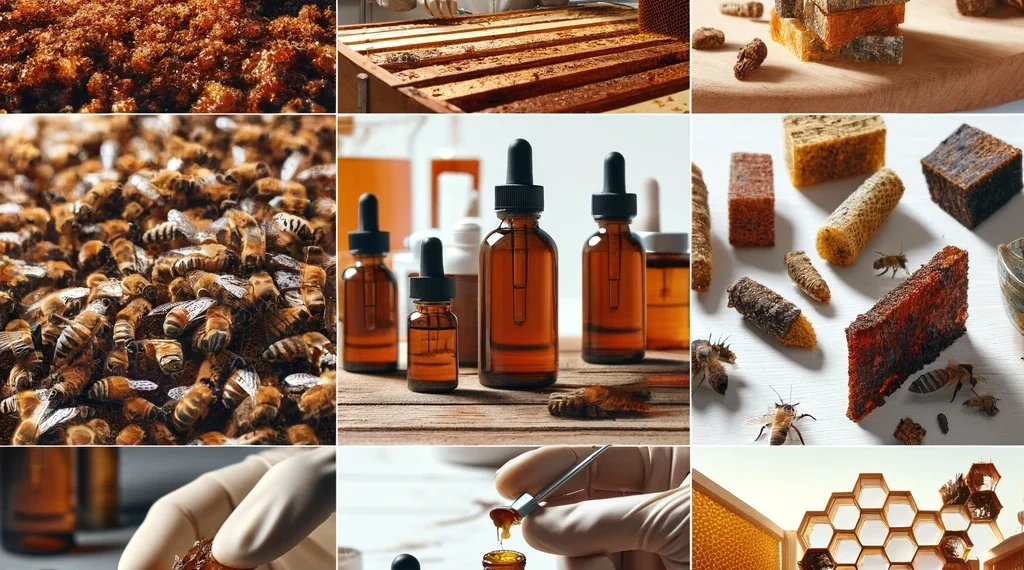
Other Benefits of Propolis
In addition to its medicinal uses, Propolis has value for industrial applications:
- Wood Varnish – The resinous compounds in Propolis produce a protective coating when applied to wood. Propolis varnish enhances the color and shine.
- Musical Instruments – Propolis varnish provides a protective sealant for violins and other string instruments. It improves the tone while preventing cracking.
- Food Preservation – Propolis coatings help extend the shelf life of fruits, vegetables, and raw meats. The antimicrobial properties prevent bacterial spoilage.
Propolis Absorption and Bioavailability
Understanding how well Propolis is absorbed and utilized by the body assists with determining optimal doses.
- Fat Solubility – Many active compounds in Propolis are fat soluble. Consuming Propolis with fats or oils enhances absorption compared to taking it alone.
- Processing – Ethanol extracts of Propolis appear to have higher bioavailability than raw Propolis. Extract processing concentrates the active compounds.
- Cooking – Heating Propolis to high temperatures may destroy some of the delicate volatile oils and flavonoids. Raw or lightly cooked Propolis retains more active components.
- Synergies – Combining Propolis with oils like coconut or olive oil may enhance the absorption of fat-soluble compounds. Antioxidants like vitamin C help stabilize it as well.
Recommended Doses of Propolis
There are currently no standard dosage guidelines for Propolis. But studies testing its’ effects have used dosages ranging from:
- 20 to 500 mg per day of
 Propolis extract capsules or liquid tinctures.
Propolis extract capsules or liquid tinctures. - 5 to 10% topical Propolis creams applied to the skin.
- 3 to 10 drops of Propolis tincture diluted in water and used as a mouth rinse.
Start with lower doses of Propolis and increase gradually as tolerated. Discuss optimal dosing with your healthcare provider.
Current Dietary Guidelines
Propolis is not yet included in major dietary guidelines or recommendations. But preliminary research indicates:
- Propolis supplements around 100 to 500 mg per day appear safe for general immune and antioxidant support.
- Propolis extracts standardized to certain flavonoids like pinocembrin and galangin ensure reliable potency.
- Topical Propolis creams used short-term may aid wound healing and skin inflammation.
- Propolis mouthwashes potentially benefit oral hygiene when used for short durations.
Always select high-quality Propolis from reputable suppliers. Avoid applying it to open wounds or taking high doses long term without medical supervision.
Potential Side Effects of Propolis
When used appropriately, Propolis is generally well tolerated. But a few precautions are warranted:
- Allergies – Propolis may cause allergic reactions in those sensitive to bees, honey, pollen, conifers, or poplars. Discontinue use if irritation develops.
- Surgery – Propolis may affect blood clotting and blood sugar levels. Stop taking it 2 weeks before scheduled surgery.
- Drug Interactions – Propolis may interact with immunosuppressants, blood thinners, chemotherapy drugs, and diabetics medications. Consult a doctor before combining it with prescription medications.
- Dosing – Excessively high doses of Propolis may cause stomach upset, headache, rash, and mouth ulcers. Follow recommended dosing guidelines.
Sustainability and Environmental Impacts
Propolis collection does not  typically harm bee colonies when gathered responsibly. But overharvesting it or disturbing hives during cold seasons can stress bee populations.
typically harm bee colonies when gathered responsibly. But overharvesting it or disturbing hives during cold seasons can stress bee populations.
Look for Propolis from ethical beekeepers who use sustainable collection practices. Organic and fair trade certified Propolis ensures bee welfare standards were met during production.
Frequently Asked Questions About Propolis
- Does Propolis really have antibacterial properties?
- Yes, numerous studies have found Propolis inhibits the growth of harmful bacteria. It contains antibacterial compounds and may boost immune cells to fight infections.
- Can Propolis treat cold sores?
- Early research shows Propolis may speed healing of cold sores when applied topically. The antiviral and anti-inflammatory properties help soothe cold sore symptoms. More studies are still needed.
- Is Propolis safe during pregnancy?
- There is not enough data to determine if Propolis is safe during pregnancy. Pregnant women should avoid Propolis supplements or extracts until more research emerges. Topical Propolis creams appear safer. Consult your doctor.
- Does Propolis really strengthen your immune system?
- Propolis contains compounds that enhance immune cell activity. Studies indicate Propolis supplements may reduce the risk of colds, flu, and minor infections. More research is warranted, but it shows promise for immune support.
- Can dogs eat Propolis?
- Propolis is generally safe for dogs. Some pet owners use Propolis supplements to support their dog’s health. But introduce it slowly and consult your veterinarian about appropriate dosing for your dog.
Conclusion
Propolis has been prized since ancient times as a natural healing remedy. Today, scientists are validating many of its traditional medicinal uses and uncovering new therapeutic benefits. When used appropriately, it may support immune function, oral health, wound healing, and more. Additional clinical studies on Propolis are underway, but the future looks bright for this diverse, bee-produced compound.
References
- Kuropatnicki, A., Szliszka, E., & Krol, W. (2013). Historical aspects of Propolis research in modern times. Evidence-based complementary and alternative medicine, 2013.
- Sforcin, J. M. (2007). Propolis and the immune system: a review. Journal of ethnopharmacology, 113(1), 1-14.
- Sawicka, D., Car, H., Borawska, M. H., & Nikliński, J. (2012). The anticancer activity of Propolis. Folia Histochemica et Cytobiologica, 50(1), 25-37.
Sources





